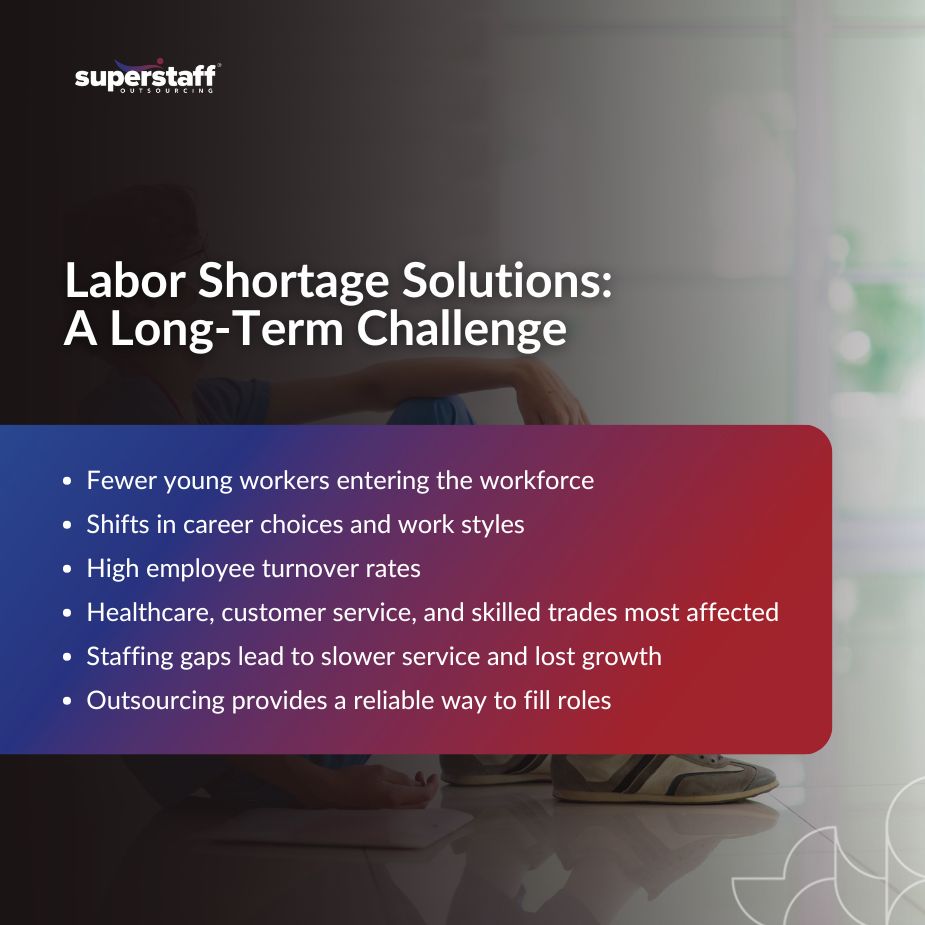
Finding and keeping skilled workers is becoming harder across many industries, especially in customer service, healthcare, logistics, and technology. With fewer workers available, companies face real challenges in keeping operations running smoothly. That’s why finding effective labor shortage solutions is more important than ever. Outsourcing has emerged as a practical way to quickly fill staffing gaps, maintain flexibility, and deliver quality service without the long wait times or high costs of traditional hiring.
Discover how outsourcing can help businesses build a flexible workforce, adapt to changing demands, and keep operations steady even when local hiring falls short. Understanding these strategies will reveal why outsourcing is one of the smartest ways to handle labor shortages while keeping service levels strong.
Labor Shortages Are a Long-Term Challenge

The labor shortage is not a short-term issue that will disappear soon. It is a long-term challenge that affects many industries. Several factors cause this:
- Aging populations mean fewer young workers enter the job market.
- Many workers prefer different careers or work styles than before.
- High turnover rates make it hard to keep skilled employees.
Industries like healthcare, customer service, and skilled trades face bigger problems finding the right people. When staffing is inconsistent, service slows down, customers wait longer, and companies lose chances to grow.
Because of these challenges, many businesses search for labor shortage solutions that do not depend only on local hiring. Outsourcing stands out as a strong option to fill these gaps.
How Outsourcing Helps Overcome Labor Shortages
Outsourcing provides quick access to skilled workers without the delays of traditional hiring. Instead of spending months recruiting, interviewing, and training new employees, companies can rely on outsourcing partners who already have trained teams ready to jump in. This speed helps businesses avoid costly downtime and meet customer needs without interruption.
Here are some key benefits:
-
Fast onboarding
Outsourcing providers can place workers within days, not months. This rapid deployment means businesses can respond quickly to sudden changes in demand or unexpected staff shortages, keeping projects and services on track.
-
Access to global talent
Businesses are no longer limited by local labor markets. Outsourcing opens doors to skilled professionals worldwide, making it easier to find specialized expertise or fill roles that are hard to staff locally.
-
Reduced internal workload
Outsourcing partners handle recruitment, training, and supervision. This frees up company resources and lets internal teams focus on core tasks instead of spending time managing hiring and employee development.
These points make outsourcing a practical labor shortage solution that helps companies keep operations running smoothly even when finding local workers is difficult. By leaning on experienced outsourcing providers, businesses can maintain service quality and avoid disruptions caused by workforce gaps.
Strategies for Maintaining Business Agility with Outsourcing
Maintaining business agility means adjusting quickly to changes in demand, customer needs, and market conditions. Outsourcing supports this by providing flexible workforce solutions that let companies scale their staff up or down as needed.
Here’s how outsourcing improves agility:
- Scalable Staffing – Businesses can add workers during busy seasons and reduce staff when demand drops without the costs of permanent hires.
- Extended Support Hours – Outsourced teams can work nights, weekends, or holidays, covering hours when internal teams might not be available.
- Testing New Markets or Services – Companies can try new services or enter new markets with outsourced support before making long-term hiring decisions.
- Quick Role Coverage – When internal employees are absent or leave, outsourced workers can fill those roles quickly to avoid gaps.
These strategies show how outsourcing is not just a short-term fix but a way to keep a company flexible and responsive.
Ensuring Quality and Consistency with Outsourced Teams
A common concern with outsourcing is whether external teams can match the quality of internal staff. The good news is that trained outsourced teams can follow company workflows and service standards just like in-house workers.
To maintain consistency, many outsourcing partners:
- Use shared knowledge bases and clear documentation.
- Follow standardized processes aligned with the company’s needs.
- Provide ongoing training to their teams.
- Use communication tools to stay connected with internal staff.
These practices ensure that outsourcing does not lower service quality. Instead, it helps companies avoid disruptions caused by staff shortages or absences.
Who Benefits Most from Outsourcing as a Labor Shortage Solution?
Outsourcing works well for many types of organizations, from small startups to large enterprises. It offers flexible workforce solutions that fit various industries and business sizes, helping them overcome staffing challenges quickly and efficiently. Here are some examples of businesses that benefit the most:
-
Retailers
They often face seasonal spikes in customer service needs. Outsourcing helps them scale support teams up during busy periods without the cost or delay of hiring permanent staff.
-
Healthcare providers
High call volumes and administrative tasks can overwhelm internal teams. Outsourcing offers extra help to handle overflow work, ensuring patients and clients receive timely responses without adding strain to existing staff.
-
Logistics and e-commerce
These businesses operate around the clock to meet customer expectations. Outsourced teams can manage 24/7 order fulfillment and customer care, providing consistent service even during peak times or staffing shortages.
-
Tech companies
Supporting products and handling Tier 1 customer issues require specialized skills. Outsourcing connects tech firms with trained professionals who can maintain support quality and respond quickly to user needs.
-
Small and medium-sized businesses (SMBs)
Many SMBs lack large HR departments or recruitment resources. Outsourcing allows them to fill staffing gaps effectively without the overhead of managing full-time hiring processes.
Any company facing talent shortages or rapid changes in demand can turn to outsourcing as a labor shortage solution to maintain stability and stay competitive in its market.
Key Benefits of Flexible Workforce Solutions
Flexible workforce solutions through outsourcing offer advantages beyond just filling open positions. These include:
- Cost savings: Avoid expenses tied to permanent hiring and training.
- Improved speed: Quickly adjust staffing levels without long recruitment cycles.
- Risk reduction: Reduce the impact of local labor market fluctuations.
- Focus on core work: Let internal teams concentrate on strategic tasks instead of hiring challenges.
These benefits explain why more companies are turning to outsourcing to handle their labor shortages.
Flexible Staffing to Meet Changing Demands
Outsourcing is a proven labor shortage solution that keeps businesses running smoothly even when workforce challenges arise. It offers fast access to skilled workers, flexible staffing options, and consistent service quality that businesses can count on.
By partnering with an outsourcing provider, companies can ease the pressure of hiring, adjust staffing quickly as needs change, and maintain high service standards without disruption. These flexible workforce solutions support both immediate staffing gaps and future growth plans, making them a smart choice for businesses focused on stability and success.
If your business faces staffing shortages or needs to stay agile amid changing labor markets, outsourcing offers practical ways to overcome these hurdles. SuperStaff provides tailored outsourcing solutions designed to fit your unique needs. Reach out today to learn how we can support your workforce and help your business stay adaptable and competitive.






